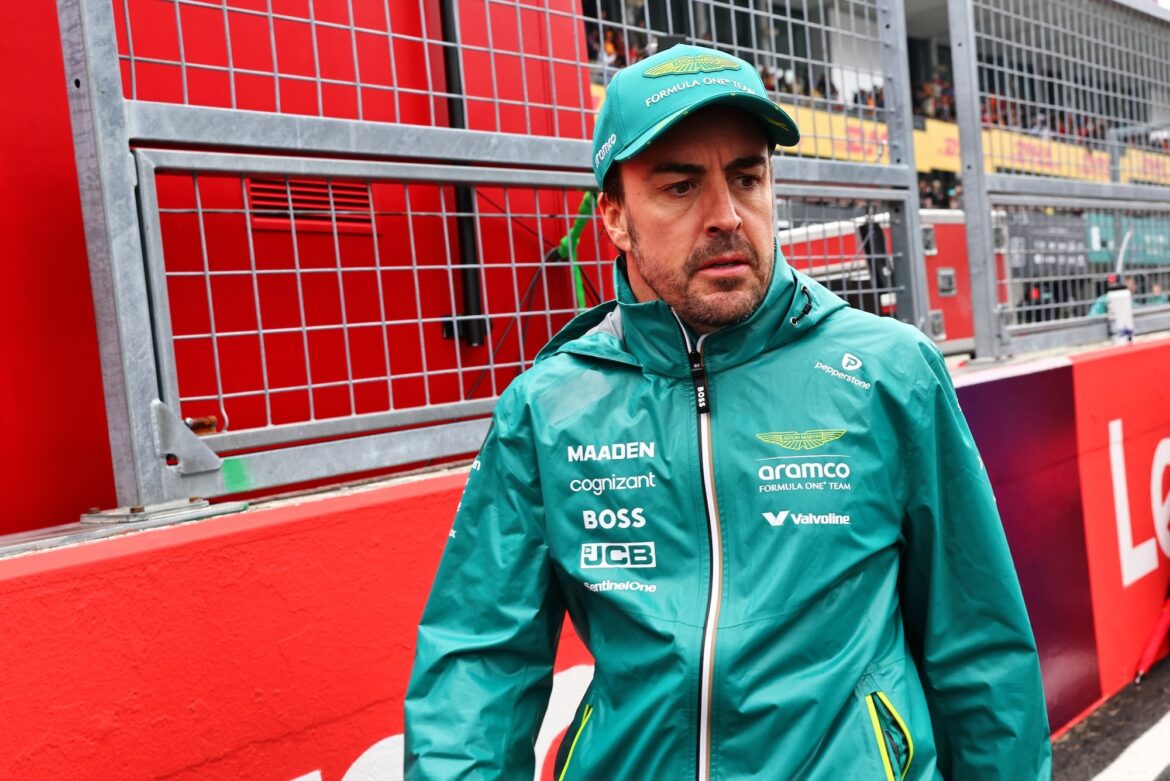Fernando Alonso expressed his belief that he could have contended for a podium finish alongside Lewis Hamilton during the Sprint race at the Miami Grand Prix. However, he identified a strategic misstep by Aston Martin as the reason for missing that opportunity. The race began under wet conditions, prompting all drivers to start on intermediate tires. As the track began to dry, Hamilton was among the first to switch to dry tires at the opportune moment, ultimately securing third place.
Alonso shared that he had also wanted to make the tire change but his suggestion was not adopted by the team. “We thought it wasn’t the right moment, and in the end, we found ourselves battling with Liam (Lawson),” he remarked after the Saturday race. Lawson, driving for Racing Bulls, even made contact with Alonso, leading to an early exit from the race for the Spanish driver. “We shouldn’t have been in that position. We should have been fighting with Lewis, perhaps for P3 or P4,” Alonso lamented.
The two-time Formula 1 champion expressed disappointment over the team’s decision, emphasizing that he could have achieved a more significant result. “I don’t dwell on what happened afterward because I should have been side by side with Hamilton for third place if we had pitted at the right time,” he noted. Alonso pointed out that the team relied heavily on simulation data rather than considering his insights from the track. “It’s challenging to predict everything, and not many cars pitted at that moment. Every car behaves differently under those conditions. In our case, it was clear that the intermediates were no longer effective, but it’s difficult to see that on the computer,” he added.
When asked if the team should have heeded his suggestion, Alonso responded directly, “Yes, definitely, but… that’s a question for them,” he concluded.
Alonso’s thoughts highlight the importance of communication and strategy in Formula 1 racing. The interplay between a driver’s instincts and a team’s data analysis can significantly impact the race outcome. As conditions change rapidly on the track, the ability to adapt and make real-time decisions becomes crucial. Drivers like Alonso, with extensive experience, often have valuable insights that can lead to better performance.
The Miami Grand Prix showcased the unpredictable nature of racing, where even slight miscalculations in strategy can lead to lost opportunities. The early wet conditions required teams to make quick decisions about tire choices, and those who executed their strategies effectively reaped the rewards. In contrast, teams that hesitated or relied too heavily on simulation data faced challenges that could alter the course of the race.
In Formula 1, where every millisecond counts, the dynamics between drivers and their teams can determine not only race outcomes but also championship standings. The balance between data-driven decisions and a driver’s real-time feedback is a complex dance that teams must navigate. Alonso’s experience serves as a reminder that intuition gained through years of racing can sometimes outweigh pure statistical analysis.
The Miami Grand Prix also added another layer of complexity with its unique circuit layout and weather conditions. Drivers had to remain adaptable, and those who could pivot quickly often found themselves in advantageous positions. Hamilton’s timely tire change is a prime example of how critical it is to seize the right moment during a race.
Alonso’s frustrations are not just about this one race; they reflect a broader narrative in motorsport where teams must learn to trust their drivers’ instincts. As technology and data analytics continue to evolve in racing, finding the right balance between human intuition and machine learning will be essential for success.
Looking ahead, Alonso and Aston Martin will likely review their race strategies to ensure that they can capitalize on similar opportunities in future races. The lessons learned from the Miami Grand Prix can help refine their approach, enabling them to respond more effectively to the challenges posed by varying track conditions.
In the highly competitive world of Formula 1, where the margins for error are razor-thin, every decision matters. For Alonso, the desire to compete at the highest level remains strong, and he will undoubtedly continue striving for podium finishes. His experience and skill make him a formidable competitor, and as he navigates the challenges of the season, the lessons from Miami will serve as a valuable reference point.
As the racing season progresses, fans will be eager to see how Alonso and Aston Martin adapt their strategies. The interplay between driver intuition and team strategy will continue to be a focal point as teams strive for excellence on the track. The Miami race serves as a reminder of the ever-present challenges in Formula 1, where each race offers a new opportunity for triumph or disappointment.
The world of motorsport is not just about speed; it is also about strategy, communication, and the ability to adapt on the fly. Alonso’s insights into the dynamics of the race team underscore the importance of collaboration between drivers and their teams. As they move forward, the aim will be to harness both data and experience to achieve the best possible results.
In summary, Alonso’s reflections on the Miami Grand Prix reveal the intricate balance of strategy, intuition, and the unpredictable nature of racing. As teams analyze their performances and refine their approaches, the excitement of Formula 1 continues to captivate audiences around the globe, with each race providing a fresh canvas for competition and triumph.
